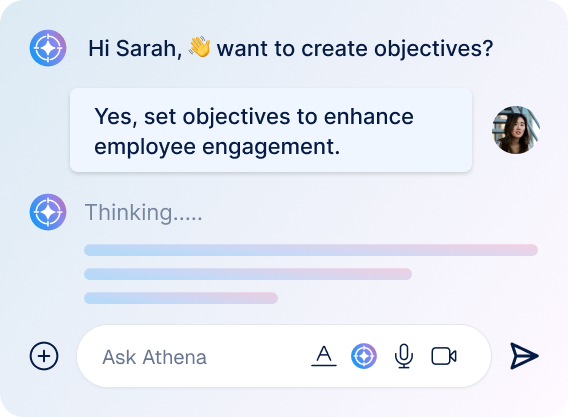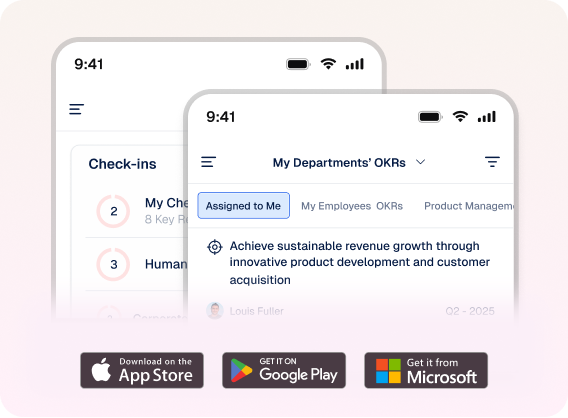Employee performance review is an essential part of any organization. Companies conduct reviews to establish an open and transparent dialogue with the employees and instill a performance culture in the organization.
Employee performance review is often a task that both employees and their managers take up as a duty, and not out of liking. It is mainly because questions borrowed from standard templates are often not customized to suit the roles of the employees, and the review loses its relevance. Also, the review lacks employee engagement when the questions promote one-way communication and fail to listen to the employee. As a result, the review does not bring out the desired outcomes.
An effective employee performance review achieves the following outcomes.
- Brings out the strengths and weaknesses of an employee
- Reviews the goals the employee has attained and missed in the period
- Establishes the connection between the employee’s and the organization’s goals
- Lets the employee to revisit and relive his/her achievements
- Motivates him/her to set higher targets for the next review period
- Helps discover the specific skills and actions that enabled him/her to succeed
- Helps the employee find the root cause of failures
- Identifies skill and training needs
- Brings out grievances and resolves conflicts with the team
- Identifies the things that need to change/improve in the organization
In order to effectively get these outcomes, you have to clearly state the objectives, customize the employee evaluation template to suit different roles, and finally, ask the right questions.
Top 10 questions to ask during a performance review
Following are the 10 most important performance review questions to ask that can make an employee performance evaluation effective.
Performance review questions related to the completed review period:
1. What were your key achievements?
The reward for work well done is the opportunity to do more.
According to Dr. Jonas Salk, a distinguished American virologist, “The reward for work well done is the opportunity to do more.” Asking this question puts the employee’s achievements into perspective. It makes the employee understand that the organization values their personal achievements and considers them a part of its success and growth. This recognition can inspire employees to aim higher and achieve more.
2. Have you achieved your goals? If not, what prevented you from achieving them?
This question helps verify the employee’s performance against their goals set for the review period. By analyzing this, you can fathom the abilities of the employee and support then in setting and achieving the goals in the future.
3. What are the skills or support that helped you achieve your goals?
Achievements should be celebrated. At the same time, it is important to identify the factors behind those achievements, hone them, and leverage them to achieve better performance and success in the future. The organization can also plan relevant training sessions to build on those success factors and help the employee become more impactful.
Performance review questions related to the next review period:
4. What are your goals for the future, and how do you plan to achieve them?
The future goals are always set based on the past achievements. This question helps to verify if the employee is achieving the goals and setting higher targets every time. Asking for the action plan ensures that the employee knows how to achieve the goals.
5. What tools and resources do you need to attain your goals?
Sometimes, the employee may have the skills and work competencies, but not the tools or budget required to achieve those goals. They could even be seemingly an insignificant factor or tool the organization may have previously overlooked. An employee knows about the missing piece of the puzzle.
6. How can you help the organization perform better?
It is important to establish the link between an individual’s goals and the organization’s goals and success. It is only when an employee can clearly understand their role in the organization’s success that they can meaningfully contribute to the organization.
7. How can the organization support you in achieving your goals?
The organization and the employee are mutually dependent on each other for their success. The employee’s work contributes to the growth of the organization. Likewise, the organization should also listen to the employee regarding the skills, competencies, training and support that they require to perform well and achieve the results. Addressing employee development can increase your employee retention.
8. Are there any changes that could be made in your role or in the organization that would help you perform better?
Since employees face the operational issues and inefficient processes in their day-to-day work, they are the ones who have better understanding those shortcomings. If the organization does not get to hear from the employees, these shortcomings cannot be addressed.
Performance review questions about teamwork and to get feedback:
9. Are you happy to be a part of your team?
Teamwork is key to the organization’s success. This question lets the employee talk about the experience of being in the team, how friendly their team is towards them and how supportive their team members are.
10. Tell us about your experience and expectations from the organization.
This question lets the employee give feedback about the work-life inside the organization. It captures the thoughts of the employees and helps the management see the company from an employee’s perspective.
Conclusion
Reflect/Reset feature from Profit.co enables you to reflect on the achievement for the current quarter (celebrate!!!) and apply the learnings to reset them for the next quarter. To help with this learning, Profit allows you to define your “reflection” questions and capture your learnings by simply answering them. You would then reset your key metrics for the next quarter. By asking the right questions, listening actively, and incorporating performance review comments, organizations can create a meaningful dialogue that empowers employees to excel and contribute to the overall success of the organization.





